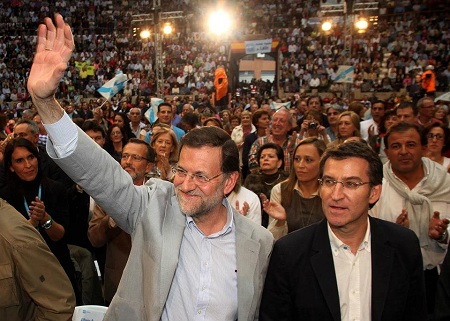Sunday’s regional elections in Galicia and Euskadi (i.e., the Basque Country) have given just about everyone in Spanish politics something to be happy about.
In Galicia, the ruling center-right Partido Popular de Galicia (PPdeG, People’s Party of Galicia) of Galician president Alberto Núñez Feijóo (pictured above, top right), the local branch of Spanish prime minister Mariano Rajoy’s Partido Popular (PP, People’s Party), extended its majority in the 75-member Parlamento de Galicia from 38 to 41 after winning 45.72% of the vote.
In Euskadi, the Partido Nacionalista Vasco (PNV, EAJ, the Basque Nationalist Party or, in Basque, the Euzko Alderdi Jeltzalea) emerged with the largest number of seats in the Eusko Legebiltzarra (Basque parliament), with 27 seats on 34.64% of the vote. Like Galicia, Euskadi’s unicameral parliament has 75 members.
As such, the PNV fended off a strong challenge from a more radical leftist and more firmly pro-independence coalition of Basque nationalists — the contest was widely seen as a fight between the more centrist PNV and the coalition of the ezker abertzalea (‘patriotic left’) formed this year, the Euskal Herria Bildu (EHB).
So what do Sunday’s regional elections means more widely for Spain?
The result will give some comfort to Rajoy (pictured above, top left), who hails from Galicia, a center-right heartland within Spain. Rajoy once served in Galicia’s parliament, and Rajoy and his party will be delighted to see Feijóo’s local Galician allies extend their majority. After extending the center-right majority in Galicia and winning a plurality, if not an absolute majority, of seats in the March 2012 regional elections in the center-left stronghold of Andalucía, Spain’s most populous region (despite remaining in the opposition), Rajoy can take respite that his party retains some support throughout the country, which is suffering its fourth year of consecutive economic malaise and unemployment that’s perhaps the highest in Europe at just over 25%.
But the result will also embolden nationalist movements throughout Spain, especially Catalunya, where the separatist movement has taken an increasingly popular turn in the past couple of months. Catalan president Artur Mas called snap elections early last month, and Mas is engaged in a high-profile political fight over regionalism with Rajoy — Catalunya votes on November 25. Urkullu, who called for calm following the election, has been vague about his plans for the region, and he has not said whether he intends to seek full independence for Euskadi or merely greater regional autonomy. But he is seen as the more moderate of the two Basque nationalist party leaders in a region where the armed separatist group, the ETA (Euskadi Ta Askatasuna), signed a ceasefire just one year ago.
The result will also provide some small amount of delight for the radical left, which can point to gains in both regions.
Continue reading Spanish conservatives take Galicia; Basque nationalists win Euskadi





